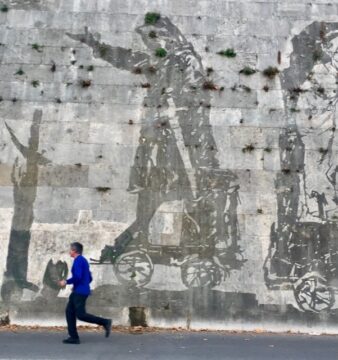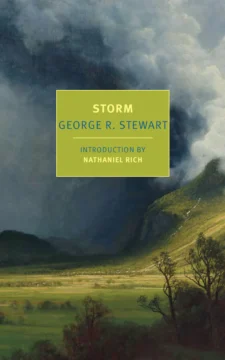by Mike Bendzela
“. . . I am one born out of due time, who has no calling here.” —Thomas Hardy

Cultural phenomena such as sports, pop/rock music, movies, television/mass media, politics, and religion/holidays have little hold on me anymore. Over time, I’ve eschewed these largely social activities. Call it adaptation; I’m not fit for them nor they for me, so seclusion has become my niche, and a fruitful one at that. Sometimes it is like I do not speak the native language — I awaken, a foreigner on my own continent, with no guide along as translator. Contemporaries will thank you for not singing along if you cannot sing in tune. This may make me culturally illiterate, but some illiterates are truly functional.
Becoming totally unsheathed from culture is to attempt the impossible: You run hard away from it, but it can run harder, having multitudes for legs. Like particulate matter in the air you breathe on your remote mountaintop, culture is ubiquitous.
Sometimes an anecdote illustrates my break with these social customs. Such episodes become signifiers and watersheds only in retrospect; at the times they occur, they seem more like puzzling anomalies or personal eccentricities. Only later do they hint towards a greater disillusionment.
Sports
This is one loss I rue a little, for I can see that fans are having fun. The noise, the team configurations, the mascots, the bands, the spectacle — all are impressive. And I can recognize the phenomenal abilities athletes have, placing them among the prodigies of our species. But the niceties of the games themselves bore me to tears, and my early associations with them were universally awful: When I went out for baseball as a kid, fly balls always thumped in the grass behind me in left field before I could even spot them. I tried out for football as a high school freshman, and the first day I heard those helmets cracking against each other I left the field and never returned, my first and last brush with physical violence. Perhaps wrestling would be more my style, less public and featuring far less velocity; but during my first match, I was so awestruck by the physique of my opponent that I ended up being pinned to the mat within sixty seconds.
Few spectators of sports actually play them, of course. My spectator experience never got much beyond high school, and one anecdote stays with me. During the last game I attended, the senior year homecoming game, our team was down by several points. We had the ball, the clock was running out. The fans in the stands were heated, hungry for a score. A play would be launched to cheers, only to finish with a crashing Awww! as our team failed to gain yards. The din was incredible. I turned to look up at the crowd in the bleachers behind me. People stood on their seats and shouted when a play started, then plopped back down, despondent. A few girls were even crying. I realized this was an emotional debacle as well as an athletic rout. A puzzling thought occurred to me at that moment of wonderment, and only years later did actual words come to me to describe what it was I was thinking:
What the hell is wrong with these people? Read more »

 With its pristine rainforest, complex ecosystems and rich wildlife, Ecuador has been home to one of the most biodiverse countries on Earth. For thousands of years indigenous peoples have also lived harmoniously in this rainforest on their ancestral land. All that has now changed. Since the 1960s, oil companies, gold miners, loggers and the enabling infrastructural workers have all played their part in the systematic deforestation and destruction of this complex eco-system. Human rights abuses, health issues, deleterious effects on the people’s cultures and the displacement of people have all become part of the indigenous people’s lives. But wherever and whenever oppression, exploitation and social injustice raises its ugly head, resistance will eventually emerge, and so it is with the indigenous Waorani people of the Ecuadorian rainforest, under the leadership of Nemonte Nenquimo.
With its pristine rainforest, complex ecosystems and rich wildlife, Ecuador has been home to one of the most biodiverse countries on Earth. For thousands of years indigenous peoples have also lived harmoniously in this rainforest on their ancestral land. All that has now changed. Since the 1960s, oil companies, gold miners, loggers and the enabling infrastructural workers have all played their part in the systematic deforestation and destruction of this complex eco-system. Human rights abuses, health issues, deleterious effects on the people’s cultures and the displacement of people have all become part of the indigenous people’s lives. But wherever and whenever oppression, exploitation and social injustice raises its ugly head, resistance will eventually emerge, and so it is with the indigenous Waorani people of the Ecuadorian rainforest, under the leadership of Nemonte Nenquimo.




 It doesn’t take a lot of effort to be a bootlicker. Find a boss or someone with the personality of a petty tyrant, sidle up to them, subjugate yourself, and find something flattering to say. Tell them they’re handsome or pretty, strong or smart, and make sweet noises when they trot out their ideas. Literature and history are riddled with bootlickers: Thomas Cromwell, the advisor to Henry VIII, Polonius in Hamlet, Mr. Collins in Pride and Predjudice, and of course Uriah Heep in David Copperfield.
It doesn’t take a lot of effort to be a bootlicker. Find a boss or someone with the personality of a petty tyrant, sidle up to them, subjugate yourself, and find something flattering to say. Tell them they’re handsome or pretty, strong or smart, and make sweet noises when they trot out their ideas. Literature and history are riddled with bootlickers: Thomas Cromwell, the advisor to Henry VIII, Polonius in Hamlet, Mr. Collins in Pride and Predjudice, and of course Uriah Heep in David Copperfield. There is something repulsive about lickspittles, especially when all the licking is being done for political purposes. It’s repulsive when we see it in others and it’s repulsive when we see it in ourselves It has to do with the lack of sincerity and the self-abasement required to really butter someone up. In the animal world, it’s rolling onto your back and exposing the vulnerable stomach and throat—saying I am not a threat.
There is something repulsive about lickspittles, especially when all the licking is being done for political purposes. It’s repulsive when we see it in others and it’s repulsive when we see it in ourselves It has to do with the lack of sincerity and the self-abasement required to really butter someone up. In the animal world, it’s rolling onto your back and exposing the vulnerable stomach and throat—saying I am not a threat.




 Risham Syed. The Heavy Weights, 2008.
Risham Syed. The Heavy Weights, 2008.
 Despite the fact that Newcomb’s paradox was discovered in 1960, I’ve been prompted to discuss it now for three reasons, the first being its inherent interest and counterintuitive conclusions. The two other factors are topical. One is a scheme put forth by Elon Musk in which he offered a small prize to people who publicly approved of the free speech and gun rights clauses in the Constitution. Doing so, he announced, would register them and make them eligible for a daily giveaway of a million dollars provided by him (an almost homeopathic fraction of his 400 billion dollar fortune). The other topic is the rapid rise in AI’s abilities, especially in AGI (Artificial General Intelligence). Soon enough it will be able, somewhat reliably, to predict our behaviors, at least in some contexts.
Despite the fact that Newcomb’s paradox was discovered in 1960, I’ve been prompted to discuss it now for three reasons, the first being its inherent interest and counterintuitive conclusions. The two other factors are topical. One is a scheme put forth by Elon Musk in which he offered a small prize to people who publicly approved of the free speech and gun rights clauses in the Constitution. Doing so, he announced, would register them and make them eligible for a daily giveaway of a million dollars provided by him (an almost homeopathic fraction of his 400 billion dollar fortune). The other topic is the rapid rise in AI’s abilities, especially in AGI (Artificial General Intelligence). Soon enough it will be able, somewhat reliably, to predict our behaviors, at least in some contexts.




 My 2024 ends with a ceremony of sorts. On December 31st, I’m sitting in a hotel in Salt Lake City an hour before midnight. I’m looking at my phone and I have it opened to Tinder.
My 2024 ends with a ceremony of sorts. On December 31st, I’m sitting in a hotel in Salt Lake City an hour before midnight. I’m looking at my phone and I have it opened to Tinder.